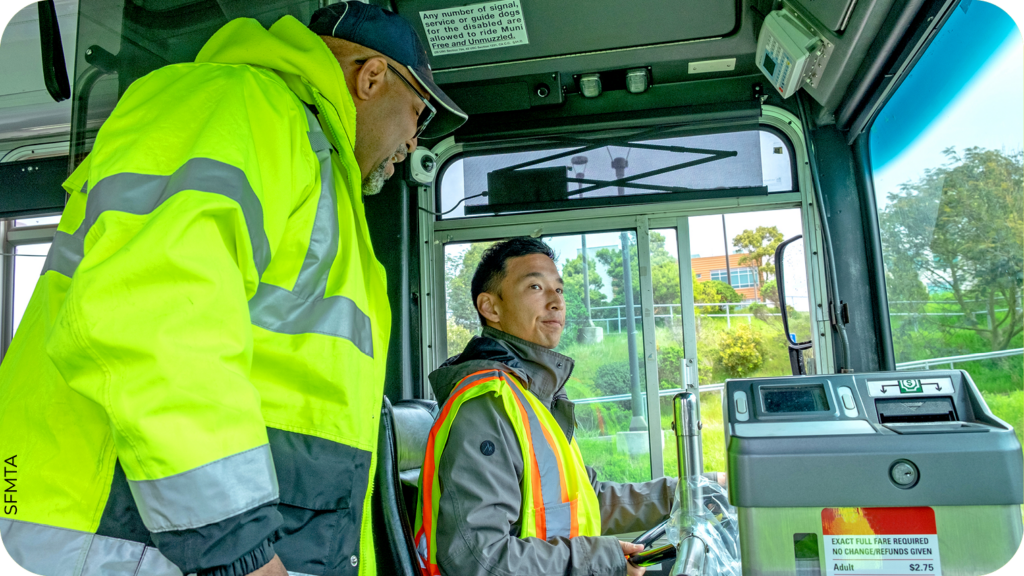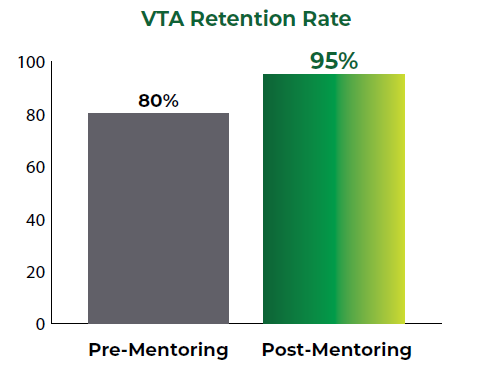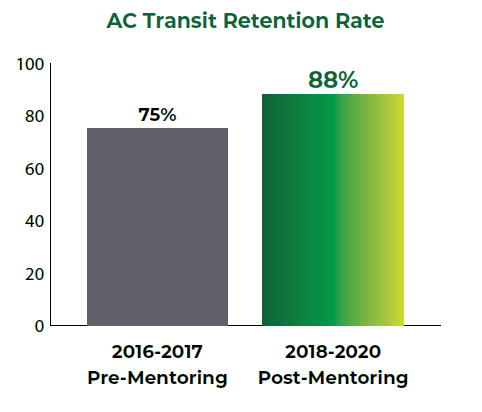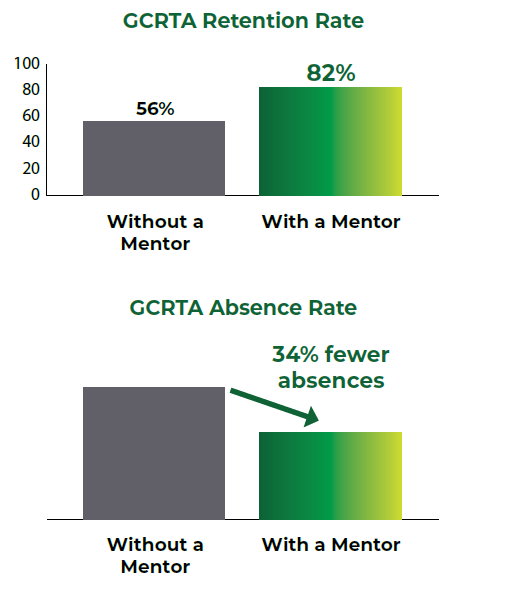TWC Research
Transit Mentorship Metrics: Positive Signs for Retention, Attendance, and Additional Outcomes

Peer mentoring is an excellent way to improve morale, skills, and retention among the transit bus operator workforce. Operator mentorship programs pair seasoned bus operators with new ones for technical skill instruction and/or individualized coaching and support to help mentees be successful in their new positions. They leverage institutional knowledge and incumbent workers’ expertise to improve training and support for new workers. Successful mentee-mentor pairs often include a mentor with significant experience in the role, shared job functions, and some overlap in demographic characteristics, so that the pair can draw upon shared experiences.
Though transit agencies and unions have benefited from mentoring for many years, in both formal and informal structures, the practice of tracking mentoring outcomes and return on investment for mentoring programs is relatively new. Agencies starting new mentoring programs can generate valuable insights and show leadership in the industry by tracking and sharing outcomes from the very beginning.
This fact sheet provides overviews of four of the country’s most robust bus operator mentoring programs and preliminary data on the success of these programs (as of Spring 2023). Three of the four mentorship programs are tied to Registered Apprenticeship programs. Although mentorship programs can be implemented outside of the Registered Apprenticeship framework, registration has significant benefits. (Learn more about apprenticeship here).
Santa Clara Valley Transportation Authority (VTA) (California)
- The mentoring program was launched in 2008 as part of a labor-management partnership called the Joint Workforce Investment (JWI).
- VTA had an 80% retention rate prior to JWI. The retention rate increased to ~95% with JWI; peer mentoring was cited as the biggest reason for the increase.
- The program improved metrics on attendance, accidents, grievances, and customer service complaints, per VTA staff.
- A recent report series provides an in-depth look at the structure of peer-to-peer mentoring at VTA.

Metro Transit (Minneapolis, MN)
- Program launched in 2018
- Total mentees to date: 531
- Total mentors to date: 108
- In the words of one mentor, “I was really hoping for something like this when I was a young driver — to have somebody to talk to, somebody to look to for guidance, to point me in the right direction. I’m glad this program is here and that I’m a part of it.”
- Participants in the mentoring program (mentees) had a lower rate of unexcused absences than nonparticipants (41% in 2018 and 44% in 2019, as opposed to 51% in 2018 and 2019 among non-participants).
- Participants had lower rates of recorded violations per hire than non-participants—0.08 versus 0.09 in 2018, and 0.03 versus 0.05 in 2019.
- No verified complaints were filed by passengers against participants, compared with 0.1 verified complaints per hire among non-participants in 2019.

AC Transit (Oakland, CA)
- Program launched in 2018
- Total mentees to date: 241
- Total mentors to date: 27
- All new operators at AC Transit have participated in mentoring since 2018.
- In the two-year period before the mentoring program started (2016-2017), AC Transit realized a 75% retention rate of 118 certified new hires. During the mentoring program’s initial launch (2018-2020), AC Transit realized an 88% retention rate of 208 operators initially hired and trained.
- Since 2020, the retention rate has steadily increased and continues to reach 89-93% of new hires retained. In their most recent complete year of data (2021), AC Transit had an operator retention rate of 93% at 6-months post-certification, and 89% after one year.
- The Mentor Coordinator reflected that “this mentorship program has had a positive impact with regard to the success of developing professional operators. The mentees are extremely grateful and appreciative for the program.”
Greater Cleveland Regional Transit Authority (GCRTA) (Ohio)
- Program launched formally in August 2022
- Total mentors to date: 65
- Total mentees to date: 81
- Retention before the program launch was about 50% at one year post training certification.
- Retention since the program began has been about 56% among those without a mentor and 82% among those with a mentor.
- Absenteeism has also improved dramatically; new operators who have been paired with a mentor have had 34% fewer absences and 47% fewer misses than their peers who have not been paired with a mentor.
- The agency’s District Director explained that “the data reflects the positive energy going into this program that is yielding tremendous results for our agency.”
- A recent TRB webinar discusses GCRTA’s mentoring program.

Other Helpful Resources:
- TCRP F-28, Bus Operator Workforce Management: Practitioner’s Guide includes case studies on both VTA and GCRTA, as well as extensive information on mentorship throughout.
- The Aspen Institute developed a Cost of Turnover Tool to help employers estimate the cost of replacing staff. This tool can be used to measure the costs of not having programs in place that improve retention. Though not specific to transit, the tool can be applied to transit agency operations.
- As part of the Apprenticeship Building America Grant Program, the Department of Labor created a Mentoring Guide, which provides an overview of the qualities of a good mentor, advice for mentoring youth apprentices, and mentoring activities.
- The Transit Workforce Center Mentor Training Workshop is designed for designated mentors to support on-the-job learning for apprenticeship programs. The workshop provides insight into mentor roles, learning styles, communication and problem-solving skills, as well as engaging participants in role playing exercises and review.
- In June 2022, the Transit Workforce Center hosted a webinar on the Fundamentals of Mentoring, in which several transit agencies and unions discussed the impact of mentorship programs on their work.
- Recruiting and retaining women is a pronounced issue in the transportation workforce. “Attracting and Retaining Women in the Transportation Industry,” a study from the Mineta Transportation Institute, emphasizes the importance of community building and mentoring for young women in this industry.
- Three of the four mentorship programs highlighted in this blog post are tied to Registered Apprenticeship programs. ProgressWorx has developed apprenticeship start-up summaries to help employers create and tailor an effective Registered Apprenticeship program.
- At the 2022 Making Connections conference, TWC hosted a session exploring how transit agencies can use mentorship programs. In “Mentoring: A Great Route to Frontline Workforce Development,” current and former mentors and mentor program coordinators discussed the fundamentals of mentoring, the mentoring process, and its impact on employees and agencies.
- Interested agencies and union can join the American Transit Training and Apprenticeship Innovators Network (ATTAIN), a peer network for transit locations that have or are interested in developing apprenticeship programs. Mentoring is a central aspect of apprenticeship programs and mentorship is often a part of ATTAIN sessions.
- To provide answers for common questions about apprenticeship and mentoring, TWC has introduced its Apprenticeship FAQ, which can help transit agencies learn about the benefits of apprenticeship and how to establish one.
- The Transit Workforce Center Resource Center contains many other resources pertaining to transit workforce development, including research, webinars, and training materials. Many of the resources pertain to transit mentorship.
Contributing Authors: Shayna Gleason, Michaela Boneva, Douglas Nevins





